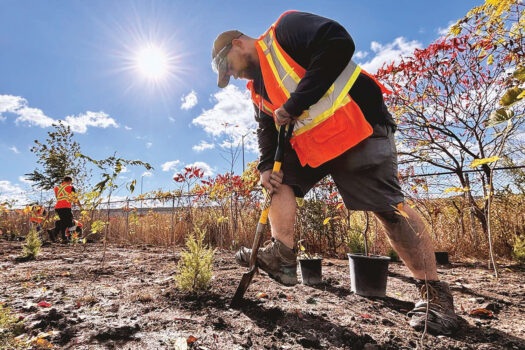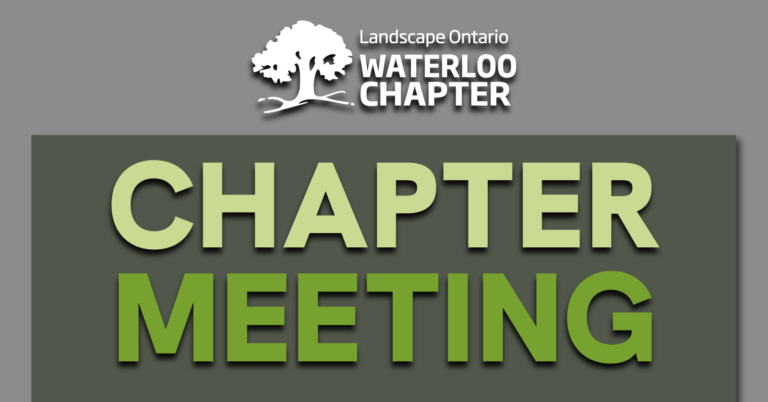By Sally Harvey CLT, CLP
Education and Labour Development Department
 Happy New Year! I hope 2011 brings good health and prosperity to all.
Happy New Year! I hope 2011 brings good health and prosperity to all.
By now, most firms will have heard from WSIB that premiums are on the increase for 2011, as a result of the rising costs of health care for workplace injuries. The increased costs originate from the injuries that by nature tend to become chronic, or are permanent incidents in some workplaces. This has high cost implications for firms, employees and their families.
The Landscape Ontario Safety Group, comprised of 24 firms in 2009, received a cheque in December for over $70,000. It represents the best safety performance in the history of the LO safety group. All 24 firms received rebate payments that reflect their share, which is based on each firm’s premium contributions to WSIB.
Sprains, strains, tears, bruises, contusions, cuts, lacerations and fractures were our weak point in the landscape horticulture industry. The most common causes of these injuries include: bending, climbing, crawling, reaching, twisting, a fall, or unsafe movement. These injuries were typically to the following body part: ankle, cervical region, external eye, forearm, and of course the lower back.
Eight 2011 New Year’s resolutions for every firm (Brought to you by Workplace Safety and Prevention Services — formerly known as Farm Safety):
- Maintain your iron grip on prevention. Work with your designated health and safety association to meet your sector-specific prevention needs.
- Join the Landscape Ontario Safety Group. Building a sustainable and effective return-to-work program is part of every Safety Group curriculum. Landscape Ontario is currently accepting registrations until Dec. 31, 2010. For more information go to www.horttrades.com/safety-groups-2.
- Network with peers. Problem-solve and share best practices with other workplaces that affect the performance of your industry group.
- Ask the right questions. The role of owners, operators, and senior executives is to manage high-cost claims. Ask to see the return to work plan for workers off on disability.
- Reinforce your return-to-work program. Balance your prevention efforts with a well-defined, inclusive and effective early and safe return-to-work program.
- Play an active role in getting people back to work. Collaborate with the WSIB to stay on top of your claims, especially long-term claims, and take advantage of available resources.
- Take a personal approach. Help workers overcome psychological barriers, such as anxiety, and the lost habit of going to work, by staying connected and setting a positive tone.
- Get involved. The WSIB’s goal is to give workers, employers and representative groups a voice at public meetings, at in-person consultations and on its website.
Fall protection
We heard from WSIB upon completion of mid-year visits to firms in 2010, that all firms were encouraged to update their Fall Protection Policy. Fall protection is required for any worker who may work at heights above 2.4 metres. The following recommendations were made to employers:
- Meet with your supervisors to discuss the importance of enforcing fall protection at all worksites.
- Adopt a zero tolerance attitude with workers and supervisors for fall protection violations.
- Include discussion and action at your health and safety meetings in regards to fall protection.
- Hold tool box talks with your workers to reinforce zero tolerance policy on fall protection and other health and safety violations.
- Supervisors should walk around more often looking for fall protection violations.
- Adopt and reinforce the zero tolerance policy. Owners could show leadership by attending a site meeting with the workers to inform them of the zero tolerance policy.
- Inform the owner(s) that the MOL has established a toll free phone number (1-877-202-0008) where the public can report unsafe work practices and conditions.
For more information on fall protection go to: http://web.thsao.on.ca/docs/fall_protection.pdf.
Landscape Industry Certified Manager (CLP) news
Humber College, in partnership with CNLA and LO, plans to offer the Landscape Industry Certified Manager designation in a new hybrid delivery format. The program will be delivered over four weeks and include four classroom days on Saturdays, and supported by online course work that will support the candidate in studies towards achieving the designation. Humber will also expand the experience by allowing each candidate to apply the theory in a practical way to their own business, or department.
Links to resources on the web
- Ministry of Labour: www.labour.gov.on.ca/english/
- WSIB: http://bit.ly/WSIBhomepage
- Careers slide show presentation: www.horttrades.com/careers-in-horticulture
- Apprenticeship Pre-registration Application: http://bit.ly/fNkYKA
Contact Sally Harvey should you have any questions at sharvey@landscapontario.com.








